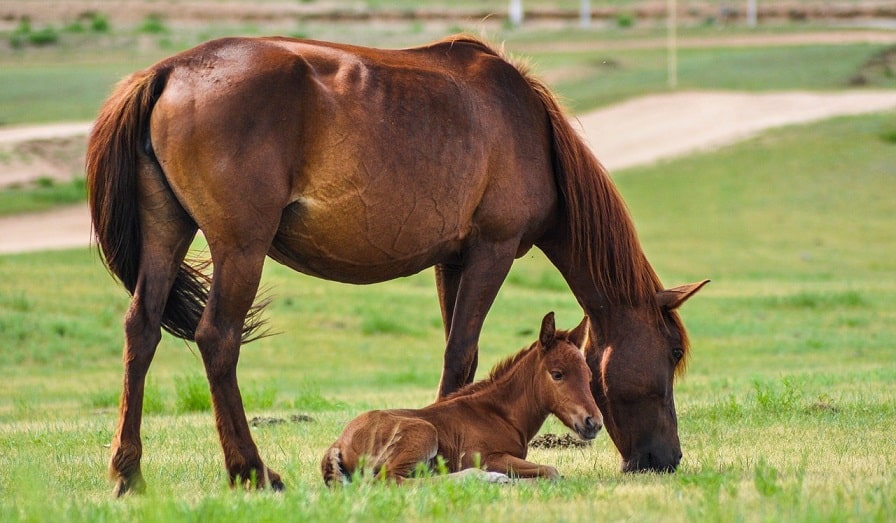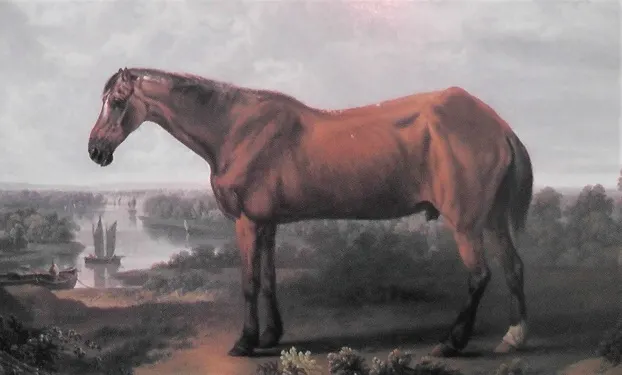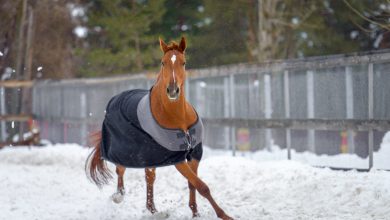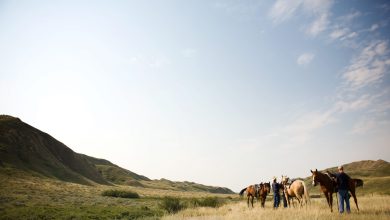What is the Average Lifespan of a Horse? (Horse Age Facts & FAQs)

This post may contain affiliate links. We earn from qualifying purchases. Learn More
You have found the perfect horse for all of your equestrian pursuits. It seems like a match made in heaven, so now you are full of questions, wondering how long you can expect your horse to live.
The average lifespan of a horse is between 25 to 30 years, although it varies between breeds. It’s not uncommon for horses to live beyond 40 years of age and the oldest horse ever, Old Billy, lived to the age of 62.
With better nutrition and care, the average lifespan of horses has increased over time. Find out below how long you can expect your horse to live for, how you can measure their age, and what you can do to prolong their life.
Let’s dive into more information about the equine life stages and what you can expect as your horse matures.
Life Stages of a Horse
A horse is not considered an adult until the age of 4 as most of their growing is not yet complete. However, this varies by region and the discipline the horse is used for. In the racing world, for example, a horse becomes an adult when it reaches 5 years of age.
A female foal is called a filly and a male foal is called a colt. When they begin to grow into adolescence, they are then referred to respectively as mares, and either a stallion or gelding, depending on whether or not the colt has been castrated (gelded).
Read more about the different horse gender terms here.
By the time a horse is around 15 – 18 years old, most consider it to have entered the Senior stage. They may begin to slow down and perform with a little less vigor, but many horses still compete very successfully well into their senior years. It varies from horse to horse.
How to Determine the Age of a Horse
If a horse has registration papers or a passport for travel, the age or date of birth is recorded on these documents. In some countries such as the United Kingdom, the law requires all horses to be microchipped, which can also be used to check for the horse’s age. However, in the event that these are not available, there are alternate methods to determining the approximate age of a horse.
Using a Horse’s Teeth to Estimate it’s Age
A horse’s incisors (the six front teeth) have unique changes as years pass that give clues about their age. There are many useful YouTube videos available to help understand how to determine the age of a horse by looking at the teeth.
Here is a basic video showing you how to age a horse by it’s teeth:
In short, by looking into a horse’s mouth, you can see several defining features that give you a rough estimate of the age.
Teeth Marks Indicating a Horse’s age
For example, by the time a horse is five years old, all of the incisors will have a hole in them called a cup, which is a dark spot easily seen looking down at the bottom row of teeth.
Each year, consecutively, the cup will wear away from a pair of teeth, beginning in the front center. When the horse ages another year, the pair just to the outside of the middle teeth will wear away next, and so on. When all of the cups have worn away, a horse is approximately eight to ten years old.
Another mark that can aid us in judging a horse’s age is the dental star. Dental stars first appear on the lower central incisors when the horse reaches six years of age. They start out as a thin dark line in front of the cup and become larger and more oval-shaped with time.
By the age of eight, dental stars will have become very noticeable. They will start appearing on the second incisors as the horse turns nine and creep onto the outer ones between years ten and twelve.
By the age of eleven, the upper incisors begin to form a hook on the back underside of the tooth, as well as the appearance of what is known as Galvayne’s Groove. This is a line that begins near the gums and slowly moves down the tooth.
A groove halfway down would indicate a horse is around 15 years old, and by the age of 20, the groove has made its way to the end of the tooth. The length and shape of the teeth also give a good indication of a horse’s age. The incisors will become longer and more angled as the horse goes into his senior years.
Other Factors to Consider When Aging a Horse
Much like humans, a horse’s body changes as it ages. They may not get gray hair and wrinkles the way humans do, but there are some common signs.
Swayed Back
A horse’s back begins to dip downward with gravity as they grow older. The withers become more prominent.
Rough Coat
A horse often loses some of its shine and has a furrier appearance as it ages. The coat is often thicker and denser as they age. Some of the hair around the face may turn grey.
Loss of Muscle Mass
The flesh is looser and harder to firm up than before
Lameness
The horse begins to have soundness issues in some cases
The Following Signs May Also be Indicators of Aging:
- Droopy lips
- Drooping fetlocks
- Diminished eyesight
- Deep hollows above the eyes
- GI tract issues
- Immunity issues (more prone to illness)
The Oldest Horse Ever Lived to 62 Years Old
Surprisingly, the famous horse that lived to be the oldest in the world wasn’t the best candidate for the title. Old Billy was a large Shire-type horse who lived in the 18th century and worked well into his senior years. Despite his hard life, he made it into the Guinness World Records by reaching a jaw-dropping age of 62, which is the equivalent of around 165 human years!

Old Billy was originally bred in Lancashire, UK, by Edward Robinson. He was quite tall, with a brown coat and white blaze on the head. For many years, he was working as a barge horse towing barges up and down river canals.
As he surpassed the maximum life expectancy of an average horse, Old Billy became quite the celebrity in his local town. The artist W. Taylor painted a portrait of him and his taxidermied head sits in the Bedford Museum and Cecil Higgins Art Gallery to his honor.
See our guides here on the oldest horses in history and oldest horse breeds.
Common Causes of Early Death in Horses
There are some common causes of death in horses, some of which a vet can help you to treat if discovered early enough.
The most common causes of death in horses include colic and other gastrointestinal issues, Cushing’s disease, and lameness/laminitis. This is why good veterinary care is so important.
How Can You Help a Horse Live Longer?
There are many factors that affect how long your horse will live. Some of these are outside of your control, such as genetics, size and conformation. On the other hand, you can help your horse live longer by giving him proper care, nutrition and exercise.
As a general rule, feeding and veterinary check-ups can make an impact. Maintaining good dental care is important, as a horse’s teeth continue to grow throughout the life of the animal. Proper nutrition and monitoring of the immune system can play a vital role in improving the longevity of the horse.
Here is a helpful guide from Oklahoma State University’s Veterinary Medicine school on how to keep your horse healthy.
Now let’s dive into some useful tips on what you can do to prolong your horse’s life depending on life stage:
Young horses
It is important not to bubblewrap your young horse, regardless of how fragile you think he is. Allowing young horses to live as naturally as possible can set them up for a long and healthy life.
As early as 3 days old, foals should be turned out with their mothers so their hooves, musculoskeletal systems and social skills can develop. As they get older, they should be turned out onto bigger fields with other foals.
Any conformational defects can be more easily corrected in the first few years of a horse’s life. As with adult horses, make sure your young one’s vaccinations, dewormig and dental checkups are up to date. Growing horses will also require a greater amount of nutrients than other life stages, so talk to your vet or nutritionist about their diet.
Adult horses
As with any other life stage, turnout is essential for keeping adult horses physically and mentally healthy. Turnout keeps the muscles well toned, the joints moving freely and prevents the development of respiratory diseases and other problems later in life. If 24/7 turnout is not possible, make sure your horse receives the right amout of exercise.
Your adult horse will need a diet that suits his activity type, with competig athletes requiring more nutrients than hobby horses. Make sure there’s always a mineralized salt block on your horse’s pasture and in his stable.
Your horse will also need a vaccination and deworming schedule that can be discussed with your vet. Do not ignore dealing with parasites as this can lead to colic. Ideally, send a fecal sample to the lab for analysis once or twice a year to ensure your horse is not overburdened with worms.
Senior horses
It is every horse owner’s responsability to make sure their horses can live out their retirement years and receive the best possible care. Older horses require careful monitorig and adjustments in their diet and daily routine.
An interesting study was conducted by Margaret Brosnahan, DVM, and Mary Rose Paradis, DVM from Tufts University. They surveyed the owners of horses between ages 20-40 and studied the records of 467 senior horses that came to the Tufts veterinary clinic between 1989 and 1999. The results showed that colic was the most common health issue in older horses, followed by musculoskeletal and respiratory diseases.
You can delay all of these problems by providing your senior horse with regular turnouts. No matter their age, older horses need to keep moving so their muscles and joints don’t deteriorate. If your horse is just standing around all day on his pasture, take him for walks or put him in a horse walker.
Your senior horse’s teeth and digestive system will also require more attention. As your horse ages, he will become less efficient in chewing and digesting feeds, which can lead to colic and weight loss. Consider using senior feeds or adding high-energy soaked beet pulp or vegetable oil to your horse’s diet. See our guide to the best horse feed brands.
Average Life Expectancy of Popular Horse Breeds
Though knowing how long your horse will live is just a guess because of outside factors as well as unknown circumstances, knowing the breed can give you some insight into how long horses like yours typically live.
The Appaloosa, Arabian, Haflinger, Percheron, and American Paint Horses are among those lucky horse breeds that are known to live the longest. Many small pony breeds will also commonly live into their forties. Meanwhile, horse breeds with many generations of inbreeding such as the Friesian Horse have a shorter lifespan of 15-20 years.
The chart below lists the average life expectancy of common horse breeds:
| Horse Breed | Life Expectancy |
|---|---|
| Thoroughbred | 25 – 28 years |
| Quarter Horse | 25 – 35 years |
| Arabian | 25 – 35 years |
| Appaloosa | 25 – 33 years |
| Miniature Horse | 25 – 35 years |
| Shire | 25 – 30 years |
| Clydesdale | 25 – 30 years |
Although this chart is a general representation, often horses of each of these breeds live far past the expected lifespan. Advances in veterinary medicine have made it possible to help our equine friends live longer, healthier lives than they did a few years ago.
What to test your horse knowledge? Click here to take our fun horse quizzes!
Have you ever wondered how old your horse is in human years? See our fun horse age to human years chart!
Frequently Asked Questions
How long do racehorses live?
Racehorses have the same approximate lifespan as other horses, usually 25-30 years. Most are retired from the track before the age of 10 and successful racehorses will go on to have breeding careers. Many off-track racehorses are rescued by shelters, where they are rehabilitated and offered for adoption as a companion or hobby horse.
Do wild horses live longer than domesticated horses?
On average, wild horses don’t live as long as domesticated horses since they don’t receive regular veterinary care. It is rare for a wild horse to live beyond 20 years without human intervention. Older and weaker horses in the wild often can’t keep up with the herd and are taken by predators.
At what age should a horse stop being ridden?
As a general rule, a horse should transition from regular to light ridden work as they go into their 20’s. However, with proper care and nutrition, a horse’s working life can be prolonged by many years. In any case, a horse should stop being ridden by the age of 30 and allowed to live out its retirement years.
What age horse is good for a beginner?
Most beginner riders will struggle with confidence, so an older horse with lots of experience is ideal. Horses aged 15 years and over will make a great first horse for a beginner rider.


